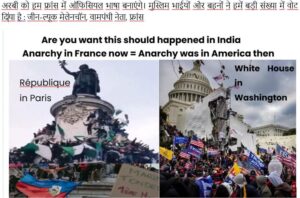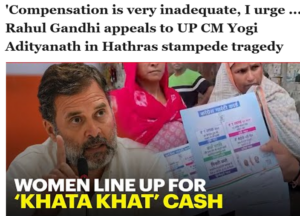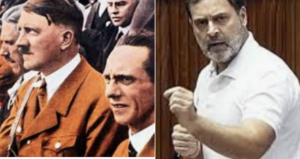
Millions of salutes to such a great man, Ajatshatru, Pandit Deendayal Upadhyay, the pioneer of ‘cultural nationalism’, ‘Integral Humanism’ and ‘Antyodaya’, the inspiration man of the BJP family, who throughout his life worried about the upliftment of the last person standing in the last line of the society. Deen Dayal Upadhyay
Pandit Deendayal Upadhyay, the pioneer of Integral Humanism, believed that India would remain first in the world because of its cultural values. The definition of integral humanism established by him is more timely in the present perspective.
Gandhi’s nationalism was in favor of labor power. Gandhi believed that every person should contribute to the society with full honesty by working hard. Only then he has the right to accept anything. According to Gandhi, every person has the basic right to get employment. Gandhi’s nationalism had sensed the bad effects of modern civilization in the year 1909 itself. That’s why in the booklet named ‘Hind Swaraj’, Gandhi advocated to limit the needs of human beings. Gandhi wanted the village to emerge as the main unit of production and consumption.
Hind Swaraj’ named booklet In Gandhi has human beings Of Requirements To Limited to keep Of Advocacy Of Was. Gandhi Want Were That Village Production And consumption Of Chief Unit Of Form In Emerge
Here is an example in this context:
Congress session was going on. It was early morning, Gandhiji; While talking with Nehru ji and other volunteers, he was washing his hands and face.
The amount of water Gandhiji had taken to rinse his mouth ran out and he had to take water again. Gandhiji got a little upset due to this.
Seeing the changing expression of Gandhiji’s face, Nehruji asked, “What happened, you are looking somewhat upset?”
The rest of the volunteers also started looking towards Gandhiji.
Gandhiji said, “The amount of water I had taken is over and I have to take water again, it is a waste of water!!!”
Nehru ji smiled and said – “Bapu, you are in Allahabad, Triveni Sangam is here, Ganga-Yamuna flows here, there is no desert where there is shortage of water, what difference does it make if we use a little more water?” ? ,
Gandhiji then said- “Whose Ganga-Yamuna are they?” It doesn’t flow only for me, everyone has equal rights on their water? Everyone should understand this very well that it is not right to misuse natural resources, no matter how abundant something is present, but we should use it Spend only as per the need.
And second, if we abuse something because of its greater availability, then our habit gets spoiled, and we start behaving in the same way in other cases.
Gandhi believed that nationalism and humanity are complementary to each other. It was Gandhi’s belief that nationalism rests on sacrifice with sacrifice, good conduct and ideals that do good to the world. There is no place for violence in Gandhi’s nationalism. Gandhi’s nationalism stands completely apart from even the nationalism of the West.
Sudhir Kumar, Professor of Political Science, Dayal Singh College, University of Delhi: India got independence on cultural nationalism. If India’s democracy could survive, then it is also because of cultural nationalism. This is not the case in our neighboring countries, we are seeing the situation there. Democracy cannot live without any culture. Cultural nationalism is in the soul of India.
He further says, ‘Take Mahatma Gandhi only. He used to start work many times by bathing in the Ganges or by shaving his hair. From Mahabharata to Vedas it will be found, but Kautilya wrote it very well. But its essence is very generous. It was all for the welfare. There should be a debate on cultural nationalism. There is no doubt that it is now being used for political gains.
If seen in true sense, nationalism is such a strong feeling, which is a symbol of loyalty, love and dedication of its citizens towards a nation. If you look at most of the political thinking since the French Revolution till now, you will see how nationalism is ingrained in all of us. There is no doubt that it is the spirit of nationalism, which motivates the citizens of a country to maintain unity, teaches them to love their cultural values and to give importance to the nation before themselves.
What is Gandhi’s nationalism and what have been its characteristics:
With his Satyagraha in South Africa, Gandhi sounded the trumpet of his nationalism. In India, from Champaran Satyagraha to Kheda Satyagraha, Vaikom Satyagraha, Civil Disobedience Movement and Quit India Movement, Gandhi’s nationalism has been a part of it. Fasting, picketing, non-cooperation, strike, boycott and hunger strike etc. have been the main elements of Gandhi’s nationalism. National education, independence, communal unity and freedom have been important elements of his nationalism. Vasudhaiva Kutumbakam was also a major part of his nationalism.
Emphasizing on Swadeshi, he had described it as the most powerful means of making the nation economically prosperous, because it provides economic strength to the country by staying in the country’s money.
Along with politics, social, economic and cultural independence has also been an important part of Gandhi’s nationalism.
30 Jan 2021
Gandhi’s path of non-violence linked to cultural nationalism
Kalraj Mishra
It was Gandhi who gave a broad perspective to the freedom movement and linked it to Indian culture and life values.
The development of our country as a nation is not only due to the existence of land here and any political authority, but because of our culture which is more than five thousand years old. Despite diversity in languages, traditions of regions in a large area, that is why our cultural values have remained alive continuously. Gandhiji linked this cultural vibrancy with non-violence and moral life values in the freedom movement. This was his cultural nationalism in which he united the nation culturally by leading the movements to free the country from the slavery of the British.
Keeping the nation paramount, he ensured the participation of people in his movements. For him, independence was not only limited to the freedom from the slavery of the British, but he insisted on the establishment of Swaraj in the whole country. That’s why, on the pretext of adopting Swadeshi, he also suggested the way to love the nation and its related things and culture.
Nehru’s views were different from this.
development of democratic culture
This aspect of Gandhiji has also always impressed me that instead of opposing the other side, he linked politics with creation and tolerance. Spinning yarn on the charkha, boycotting foreign goods was not a protest against the other side, apparently creation was concern and satyagraha tolerance. He initiated a positive change in the public mind by creating mutual harmony among the people. In a way, it was like developing a democratic culture in the country even during the period of slavery.
Non-violence path: When Gandhiji was banned by the British Government in the Neel Movement, in 1917, what he kept before the judge, still flashes in the mind. He said, ‘I have broken the law. You can punish me for this but I have the right to live anywhere in my country.
Ultimately, the British had to bow down in the Champaran movement due to the movement of non-violent methods. This movement gave way to the country in which the violent-non-violent nature of the isolated country was completely organized in the form of freedom movement and non-violence became an effective weapon against the British Raj.
Mahatma Gandhi ji gave moral courage to the people of the country to fight the violence of the state with the tradition of non-violence going on in the Indian culture. His weapon of non-violence was such that all logic of state repression fails. Even after this, if work is done to crush the people, then the state’s own morality is at stake. Gandhiji did the work of making the British mentally weak in this way.
Gandhiji cannot be said to be associated with any particular party. He was in favor of making the country completely independent in such a way that the interest of the person standing in the last line could be kept in policy making.
3 March 2020 – PM Modi said that even saying ‘Bharat Mata Ki Jai’ to the former Prime Minister smells bad. At the time of independence, some people in this Congress were against singing Vande Mataram. Now he is also facing difficulty in saying ‘Bharat Mata Ki Jai’.
It is worth mentioning here that on February 22, 2020, he said that nationalism and the slogan ‘Bharat Mata Ki Jai’ are being wrongly used to create a ‘fiery and purely emotional image of India’ which alienates millions of citizens.
Nehru ji was also allergic to the word Bharat Mata but not Mahatma Gandhi.
In 1936, Shiv Prasad Gupta built the temple of Mother India in Banaras. It was inaugurated by Mahatma Gandhi.
Pandit Nehru used to say that India means that piece of land – if you raise the slogan of Bharat Mata Ki Jai, then you are only hailing our natural resources. Nehru used to say that India is not a beautiful woman. India is a bare farmer. they are neither beautiful nor good looking
Tags: Mahatma Gandhi – Deen Dayal Upadhyay, Cultural Nationalism, Integral Humanism, Book Hind Swaraj, Democratic cultural nationalism, French Revolution, Elements of Nationalism. Vasudhaiva Kutumbakam, Sanskritik Swaraj, Non-violence linked cultural nationalism, Kalraj Mishra, Nation exist with culture, Nehru against Mother India
By – Premendra Agrawal @premendraind




